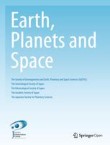Earth, Planets and Space welcomes submissions to the special issue on 'Studies on Electromagnetic Induction in the Earth: Recent advances'.
Research into electromagnetic induction of Earth and planetary interiors has increased considerably within the last decade. The 23rd biennial electromagnetic induction workshop (EMIW) held in Chiang Mai, Thailand in August 2016 was a premier event for the international research community to exchange the latest developments in the field of electromagnetic induction. This special issue is intended to promote the activity of this vibrant and growing research community and to foster future interdisciplinary studies within the broader Earth and Planetary sciences. It calls for papers on general contributions presented at the 23rd EMIW. Relevant studies that were not presented in the workshop are also welcome.
Potential topics include electromagnetic induction in the earth with emphasis on the following:
- instrumentation, sources, and data processing
- theory, modelling and inversion
- exploration, monitoring and hazards
- tectonics, magmatism, geodynamics
- marine electromagnetism
- rock and mineral resistivity and anisotropy
- global and planetary studies
Submission Instructions
Before submitting your manuscript, please ensure you have carefully read the submission guidelines for Earth, Planets and Space. The complete manuscript should be submitted through the Earth, Planets and Space submission system. To ensure that you submit to the correct special issue please select the appropriate special issue in the drop-down menu upon submission. In addition, indicate within your cover letter that you wish your manuscript to be considered as part of the special issue on 'Studies on Electromagnetic Induction in the Earth: Recent advances'. All submissions will undergo rigorous peer review and accepted articles will be published within the journal as a collection.
Deadline for submissions: 30 April 2017
Lead Guest Editor
Weerachai Siripunvaraporn, Mahidol University, Thailand
Guest Editors
Paul A Bedrosian, US Geological Survey, United States of America
Yuguo Li, Ocean University of China, China
Prasanta Patro, National Geophysical Research Institute, India
Klaus Spitzer, TU Bergakademie Freiberg, Germany
Hiroaki Toh, Kyoto University, Japan
Submissions will also benefit from the usual advantages of open access publication:
- Rapid publication: Online submission, electronic peer review and production make the process of publishing your article simple and efficient
- High visibility and international readership in your field: Open access publication ensures high visibility and maximum exposure for your work - anyone with online access can read your article
- No space constraints: Publishing online means unlimited space for figures, extensive data and video footage
- Authors retain copyright, licensing the article under a Creative Commons license: articles can be freely redistributed and reused as long as the article is correctly attributed
For editorial enquiries please contact editorial@earth-planets-space.com.
Sign up for article alerts to keep updated on articles published in Earth, Planets and Space - including articles published in this special issue!
